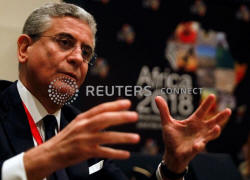|
The
bank and other donors helped arrange pledges of $11 billion in
soft loans and aid at a Paris conference last year to build new
infrastructure. But the money depends on the Lebanese government
launching reforms it has put off for years and tackling its huge
debt burden.
"In general ... we are optimistic, but at the same time our
optimism is cautious because of the economic situation in the
region," Belhaj was cited as saying in a statement from Lebanese
Prime Minister Saad al-Hariri's office after the two met.
Parliament is debating the 2019 draft budget approved by the
cabinet last month, a critical test of Lebanon's will to start
reforms. Leaders warn of a financial crisis without changes.
The budget aims to cut the deficit to 7.6% of gross domestic
product from 11.5% last year. Lebanon has one of the world's
largest public debt burdens at 150% of GDP.
"Lebanon is going down a sound path when it comes to the reforms
at the level of the budget and electricity ... but the reforms
do not end. They are continuous," Belhaj also said.
State finances are strained by a bloated public sector, high
debt-servicing costs and subsidies for power.
Promised reforms include working to reduce the deficit in the
power sector, as well as reducing debt servicing costs, waste
and corruption.
(Reporting by Ellen Francis; Editing by Catherine Evans)
[© 2019 Thomson Reuters. All rights
reserved.] Copyright 2019 Reuters. All rights reserved. This material may not be published,
broadcast, rewritten or redistributed.
Thompson Reuters is solely responsible for this content.

|
|





